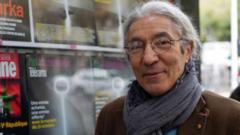Sansal's remarks about land distribution during the colonial era and Western Sahara have led to his arrest and a five-year prison term, stirring international criticism.
French-Algerian Author Sentenced to Five Years for Controversial Statements

French-Algerian Author Sentenced to Five Years for Controversial Statements
The conviction of Boualem Sansal has ignited debates over freedom of expression and diplomatic tensions between Algeria and France.
Boualem Sansal, an 80-year-old French-Algerian writer, has been sentenced to five years in prison by an Algerian court for allegedly undermining the country's territorial integrity. The conviction followed comments made by Sansal in an interview with a far-right French media outlet, where he suggested that colonial France had allocated too much land to Algeria while neglecting Morocco. He also claimed that the historically disputed territory of Western Sahara rightfully belonged to Morocco.
The sentencing of Sansal, who has been hospitalized during his incarceration due to health issues, has drawn significant attention and support from a wide array of intellectuals and political figures. Notable supporters include Nigerian Nobel laureate Wole Soyinka and French President Emmanuel Macron, who remarked on the arbitrary nature of Sansal's detention and its implications for Franco-Algerian relations. Macron stated that addressing Sansal's case is crucial for the restoration of trust between the two nations.
Sansal's supporters describe him as a victim of the strained diplomatic relations between Paris and Algiers, a sentiment echoed by friends who view him as a pawn caught in a larger geopolitical struggle. The historical context of Franco-Algerian relations is significant, having been marred by Algeria's fierce war of independence, which concluded in 1962.
Tensions intensified last year after France expressed support for Morocco’s claims over Western Sahara, leading Algeria to withdraw its ambassador to Paris and cutting diplomatic ties with Morocco years earlier. Following the court's decision, Sansal's legal team urged Algerian President Abdelmadjid Tebboune to show compassion towards the imprisoned writer.
Known for his critical views on Islamism and his outspoken criticism of the Algerian government, Sansal has polarized opinions; supporters hail him as a champion of freedom, while detractors accuse him of aligning with far-right agendas. His age has been a point of confusion, initially reported as 75, but his publisher, Gallimard, clarified he is, in fact, 80.
Sansal's portfolio includes notable works like "2084," a satire on religious extremism that garnered the French Academy's Grand Prix of the Francophonie. His upcoming novel, "Vivre," slated for release in May, tackles themes of survival and colonization of a new planet as Earth faces imminent doom.
As the case unfolds, the implications for freedom of speech and the delicate ballet of international relations in North Africa remain at the forefront of public discourse.
The sentencing of Sansal, who has been hospitalized during his incarceration due to health issues, has drawn significant attention and support from a wide array of intellectuals and political figures. Notable supporters include Nigerian Nobel laureate Wole Soyinka and French President Emmanuel Macron, who remarked on the arbitrary nature of Sansal's detention and its implications for Franco-Algerian relations. Macron stated that addressing Sansal's case is crucial for the restoration of trust between the two nations.
Sansal's supporters describe him as a victim of the strained diplomatic relations between Paris and Algiers, a sentiment echoed by friends who view him as a pawn caught in a larger geopolitical struggle. The historical context of Franco-Algerian relations is significant, having been marred by Algeria's fierce war of independence, which concluded in 1962.
Tensions intensified last year after France expressed support for Morocco’s claims over Western Sahara, leading Algeria to withdraw its ambassador to Paris and cutting diplomatic ties with Morocco years earlier. Following the court's decision, Sansal's legal team urged Algerian President Abdelmadjid Tebboune to show compassion towards the imprisoned writer.
Known for his critical views on Islamism and his outspoken criticism of the Algerian government, Sansal has polarized opinions; supporters hail him as a champion of freedom, while detractors accuse him of aligning with far-right agendas. His age has been a point of confusion, initially reported as 75, but his publisher, Gallimard, clarified he is, in fact, 80.
Sansal's portfolio includes notable works like "2084," a satire on religious extremism that garnered the French Academy's Grand Prix of the Francophonie. His upcoming novel, "Vivre," slated for release in May, tackles themes of survival and colonization of a new planet as Earth faces imminent doom.
As the case unfolds, the implications for freedom of speech and the delicate ballet of international relations in North Africa remain at the forefront of public discourse.



















